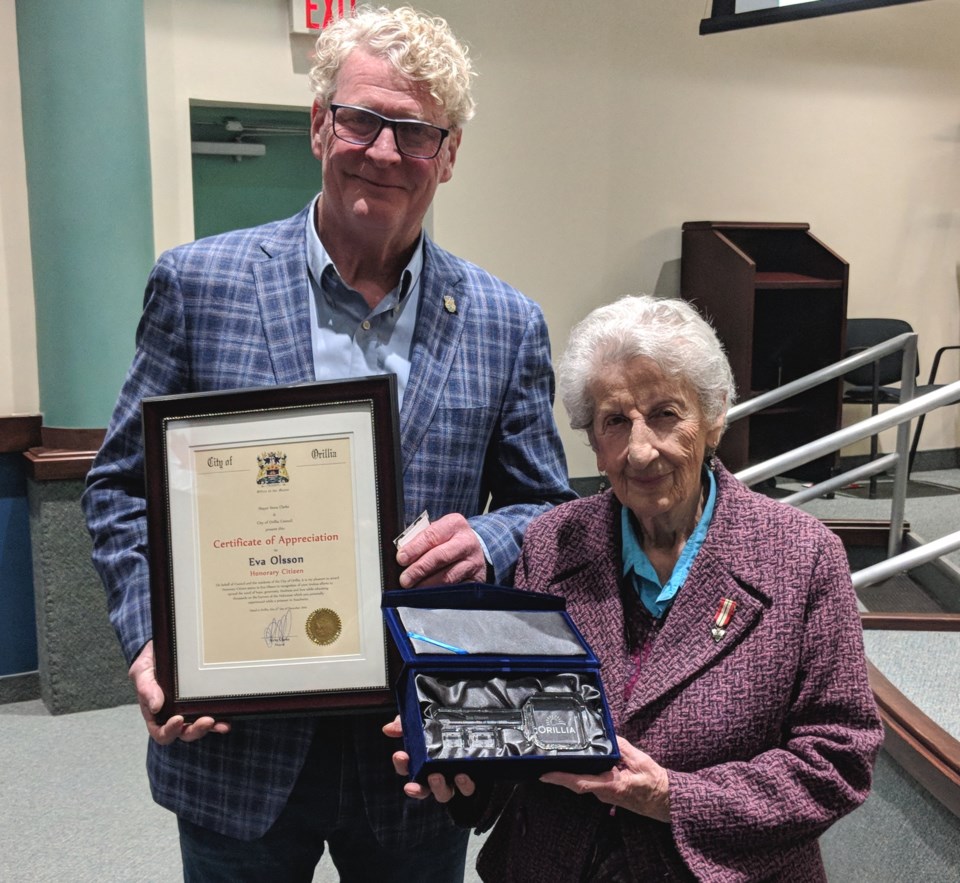Eva Olsson, who doesn’t hear well and has failing sight, who is not quite five-feet tall is a powerful, unflinching voice for change.
She is 95.
On Thursday night, the Holocaust survivor and passionate and tireless advocate for hope, was presented the Key to the City by Orillia Mayor Steve Clarke.
“Having all the reason in the world not to speak of hope and love and maybe to speak of hate, Eva does the opposite. She only speaks of hope and love,” said Clarke prior to presenting the Bracebridge woman with the symbolic, glass key prior to a meeting of city council.
Olsson, who has travelled the world to spread her message of hope, was grateful to be recognized.
“I’m honoured to receive this great gift,” she said. “I really am.”
Then she did what she has been doing for almost a quarter-century. In a soft voice filled with emotion, she told her story.
You could hear a pin drop as she recalled the horrors of being a Hungarian Jew during the rise of Hitler’s Germany.
In May 1944, she and her family were packed into a boxcar jammed with Jews. They were told they were leaving Hungary and going to a brick factory to work as slave labourers.
Instead, they were taken to Auschwitz, a “killing factory” that became the most notorious of the six Nazi extermination centres.
Olsson’s parents and four of her siblings were among the six million Jews killed at Auschwitz during the holocaust – a systematic genocide by the Nazi regime between 1941 and 1945.
Olsson was moved to the disease-ridden concentration camp in Bergen-Belsen as the Second World War raged toward its climax.
On April 15, 1945, Bergen-Belsen was finally liberated by the British. A day later, suffering with typhoid fever, Olsson was freed from the gruesome facility, sent by ambulance to a hospital in Germany.
For 50 years, Olsson did not speak of the unspeakable.
But when media reports began to surface about the massacres and genocides in Kosovo, Bosnia and Rwanda, Olsson, as the mayor noted, was “reminded of the horrors that can take place when there’s hatred between one people and another.”
She was moved to action — and has not stopped.
Last month, Olsson participated in a ceremony at a cemetery in Edmonton with about 600 students.
She said the students brought poppies and laid them on the gravestones.
“Why was I there? Because my family don’t have a tombstone and I don’t know where to go to lay a poppy and I don’t know where the wind has blown their ashes,” said Olsson.
She said the event organizers had no budget; she paid her own way because “I needed to be there.”
That sentiment has driven her since she broke her silence 24 years ago this month when her grand-daughter, at the prompting of her teacher at Monck Public School in Bracebridge, suggested the Grade 7 student interview her grandmother about the war.
That led to a presentation to the class in the portable. And from there, she has made it her life’s goal to talk about the danger of hate and the power of love — at the UN, in the Arctic, in eight provinces and to tens of thousands of people.
“Children need to know the power of hate,” said Olsson. “They do.”
That is what drives her. She says as long as she is healthy, she will continue her mission.
She shows no signs of slowing down. Her trip out west last month is a prime example.
During that busy schedule, she was asked to open an Anne Frank exhibit. Nobody told her it was a black-tie gala.
“I don’t have a black tie,” she quipped.
On the afternoon of the gala, when she learned of the dress code, she began to reflect on what she wore 75 years earlier in Auschwitz.
She told the story at the gala.
“I lived in a hole in the ground — a dirt hole that was totally dark,” she said, noting straw was used as a toilet because the young females wouldn’t go outside after dark. “By then, we knew what bullies were doing: rape.”
She said the grey prison dress she put on May 19 had not been washed by November.
And even though the allies were bombing the area, even though the camp was hit, had no water and no toilet paper, she and others were still marched to work each day.
“I had no socks, no underwear ... that was my wardrobe,” she told those at the black-tie gala.
For Olsson, the impact of the holocaust still lingers.
“I had a mom, I had a dad,” she said, her voice breaking. “There were six children in my family. Two of us survived.
“I need to speak for them because their voices were silenced by hate,” Olsson said. “Someone has to speak for them. As long as I stay healthy ... I will be on the road” to speak for them."





